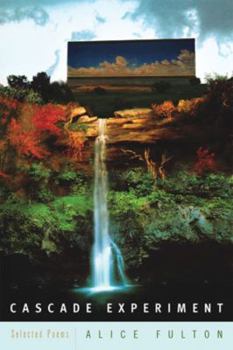Cascade Experiment: Selected Poems
Select Format
Select Condition 
Book Overview
Over the past twenty years, Alice Fulton has emerged as one of the most brilliant and honored poets of her generation. She is also among the most thrillingly inventive, compassionate, and necessary. Cascade Experiment charts the evolution of a poetics that revises the limits of language, emotion, and thought.
Format:Paperback
Language:English
ISBN:0393327620
ISBN13:9780393327625
Release Date:November 2005
Publisher:W. W. Norton & Company
Length:218 Pages
Weight:0.65 lbs.
Dimensions:0.6" x 6.5" x 8.2"
Related Subjects
PoetryCustomer Reviews
3 ratings
Good Collection from Cornell's Poet Laureate
Published by Thriftbooks.com User , 20 years ago
CASCADE EXPERIMENT collects a lot of the important pieces from six earlier books by Ithaca's Alice Fulton, who teaches there and has taken the place of A R Ammons as the person people think of when they try to think of a poet at Cornell. Unlike a previous reviewer, I never once thought of the word, "percepticide" when I read through this career-making book, but I agree it's an interesting idea and it would be a good prism through which to examine Alice Fulton's poetry. Even the earliest poetry, where she was writing Plath-like, resonant dirges about her father, had to it an abundance of culture. She is the supremely cultured poet, as Wallace Stevens was to a previous generation (he died in 1955). What we get in CASCADE EXPERIMENT is a willingness to try to listen to the other party, which I do agree, would have been a valuable lesson to learn from Abu Ghraib. Like the training bras she speaks of in her poem, "Cherry Bombs," asking, "What did training bras train/ breasts to do? Hadn't I been told/ when stranger offered dirty candy/ /to say no?" she deplores our culture in which we just don't talk to each other often, and when we do, we mistake for hostility or aggression the other party's point of view. Without other people in our universe, and more important;y their voices, we would be nothing but trophies on the wall--brass emblems of which Fulton writes, in another important poem, "Brass wombs/ they bear transcendence/ without blood, pus, piss, spit, snot, or come./ Like children, they cry, I won." She sees clearly that children can often be cruel, but that it is not the same thing as adult cruelty, the children are still trying to make it into the mirror stage, feeling themselves unappreciated because they see ow way to distinguish themselves not only from their peers, but from the entire surround. I think poets sometimes feel this way as well. In "Art Thou The Thing I Wanted," Fulton tries to distinguish her priorities, to take stock in middle age. "Everything happens to me, I think,/ as anything reminds me of you: the real estate/ /most local, most removed." She is both local and removed, and also real, like the "real estate" through which the bourgeoise attempts to maintain its grip on society and ontology. In some ways she is even better than Ammons, who never cared a fig for questions like these.
Beautiful and Compassionate
Published by Thriftbooks.com User , 20 years ago
As I was reading this stunning book, the word "percepticide" kept coming back to me. It was coined by Diana Taylor, and it sums up what Alice Fulton is getting at: that we Americans are mostly blinded by our culture. We're unwilling to look deeply and closely at the things that are most disturbing about our consumerism, our injustice, our cruelty. These poems made me think deeply about these issues: there is a continuing war against women; our culture can be so cold and cruel as to drive human beings to suicide; we have totally desensitized ourselves to the suffering imposed daily on animals; our ability to inflict pain on animals makes it easier for us to dehumanize (think Abu Ghraib) other peoples and inflict pain on them; we must not trust authority; we are infatuated with consumerism; we are destroying our environment; we need to practice compassion. We are the culture, and the culture becomes what it is by our unwillingness to look into ourselves and see how the little things we do every day build the culture. These poems are so carefully crafted, so intricately connected, so cumulative in their stance, and so ethically powerful, that I found it hard to deny the effect they had on me as I read them. That's the reason I'm writing this review (my first). I am so knocked out by the political power of this book that I wanted to spread the word. The cumulative effect of this book is exhilirating. There is so much right now that gives us cause to despair, and Fulton counters it with generosity, openness, humor, and a total absence of preachiness. The extraordinary, startling language in these poems, the way Fulton uses words "to build worlds" made me feel hopeful and energized, like Fulton, "trying to open wide" to the possibilities and hard personal work of creating a just world.
Perfect Pitch
Published by Thriftbooks.com User , 20 years ago
I've read some of Alice Fulton's poems before. So what do I think of her Selected? In all honesty, Fulton makes reading seem worth doing, worth the effort. Her poetry has ideas as well as feelings and vice versa. She has perfect pitch and can be moving (sad) or moving (funny). I read A LOT of contemporary poetry, andafter having read her poems "Some Cool" and "Split the Lark", I can say there is no living poet I respect more. This is the best book of poems I've read in years, the kind that will pay you back with interest every time you return to it.






